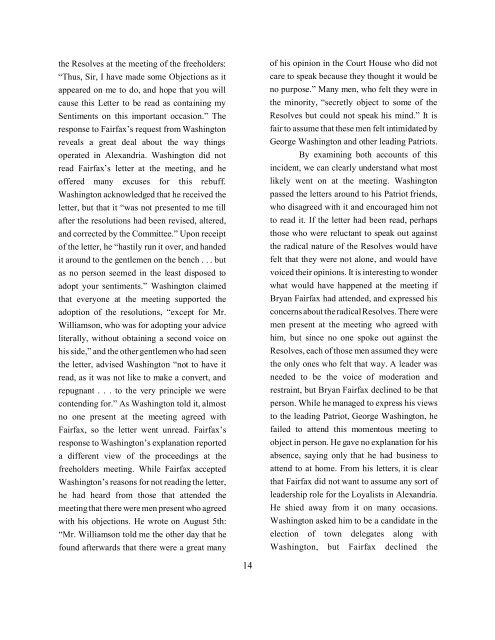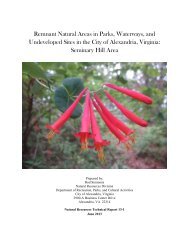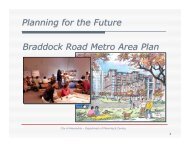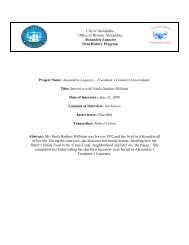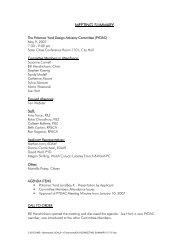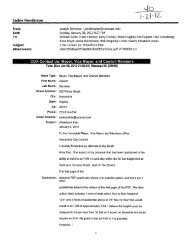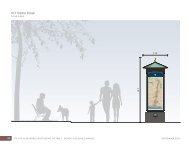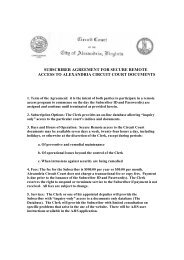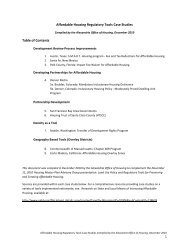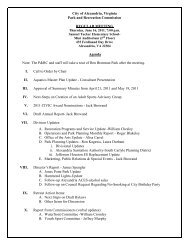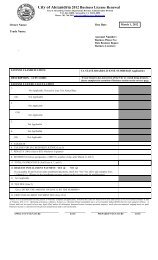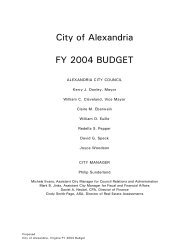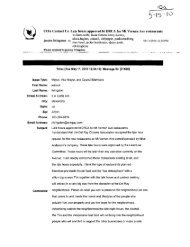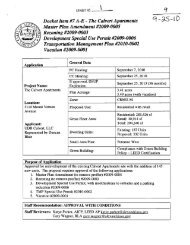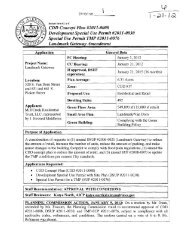LOYALISM IN EIGHTEENTH CENTURY ... - City of Alexandria
LOYALISM IN EIGHTEENTH CENTURY ... - City of Alexandria
LOYALISM IN EIGHTEENTH CENTURY ... - City of Alexandria
You also want an ePaper? Increase the reach of your titles
YUMPU automatically turns print PDFs into web optimized ePapers that Google loves.
the Resolves at the meeting <strong>of</strong> the freeholders:<br />
“Thus, Sir, I have made some Objections as it<br />
appeared on me to do, and hope that you will<br />
cause this Letter to be read as containing my<br />
Sentiments on this important occasion.” The<br />
response to Fairfax’s request from Washington<br />
reveals a great deal about the way things<br />
operated in <strong>Alexandria</strong>. Washington did not<br />
read Fairfax’s letter at the meeting, and he<br />
<strong>of</strong>fered many excuses for this rebuff.<br />
Washington acknowledged that he received the<br />
letter, but that it “was not presented to me till<br />
after the resolutions had been revised, altered,<br />
and corrected by the Committee.” Upon receipt<br />
<strong>of</strong> the letter, he “hastily run it over, and handed<br />
it around to the gentlemen on the bench . . . but<br />
as no person seemed in the least disposed to<br />
adopt your sentiments.” Washington claimed<br />
that everyone at the meeting supported the<br />
adoption <strong>of</strong> the resolutions, “except for Mr.<br />
Williamson, who was for adopting your advice<br />
literally, without obtaining a second voice on<br />
his side,” and the other gentlemen who had seen<br />
the letter, advised Washington “not to have it<br />
read, as it was not like to make a convert, and<br />
repugnant . . . to the very principle we were<br />
contending for.” As Washington told it, almost<br />
no one present at the meeting agreed with<br />
Fairfax, so the letter went unread. Fairfax’s<br />
response to Washington’s explanation reported<br />
a different view <strong>of</strong> the proceedings at the<br />
freeholders meeting. While Fairfax accepted<br />
Washington’s reasons for not reading the letter,<br />
he had heard from those that attended the<br />
meeting that there were men present who agreed<br />
with his objections. He wrote on August 5th:<br />
“Mr. Williamson told me the other day that he<br />
found afterwards that there were a great many<br />
14<br />
<strong>of</strong> his opinion in the Court House who did not<br />
care to speak because they thought it would be<br />
no purpose.” Many men, who felt they were in<br />
the minority, “secretly object to some <strong>of</strong> the<br />
Resolves but could not speak his mind.” It is<br />
fair to assume that these men felt intimidated by<br />
George Washington and other leading Patriots.<br />
By examining both accounts <strong>of</strong> this<br />
incident, we can clearly understand what most<br />
likely went on at the meeting. Washington<br />
passed the letters around to his Patriot friends,<br />
who disagreed with it and encouraged him not<br />
to read it. If the letter had been read, perhaps<br />
those who were reluctant to speak out against<br />
the radical nature <strong>of</strong> the Resolves would have<br />
felt that they were not alone, and would have<br />
voiced their opinions. It is interesting to wonder<br />
what would have happened at the meeting if<br />
Bryan Fairfax had attended, and expressed his<br />
concerns about the radical Resolves. There were<br />
men present at the meeting who agreed with<br />
him, but since no one spoke out against the<br />
Resolves, each <strong>of</strong> those men assumed they were<br />
the only ones who felt that way. A leader was<br />
needed to be the voice <strong>of</strong> moderation and<br />
restraint, but Bryan Fairfax declined to be that<br />
person. While he managed to express his views<br />
to the leading Patriot, George Washington, he<br />
failed to attend this momentous meeting to<br />
object in person. He gave no explanation for his<br />
absence, saying only that he had business to<br />
attend to at home. From his letters, it is clear<br />
that Fairfax did not want to assume any sort <strong>of</strong><br />
leadership role for the Loyalists in <strong>Alexandria</strong>.<br />
He shied away from it on many occasions.<br />
Washington asked him to be a candidate in the<br />
election <strong>of</strong> town delegates along with<br />
Washington, but Fairfax declined the


